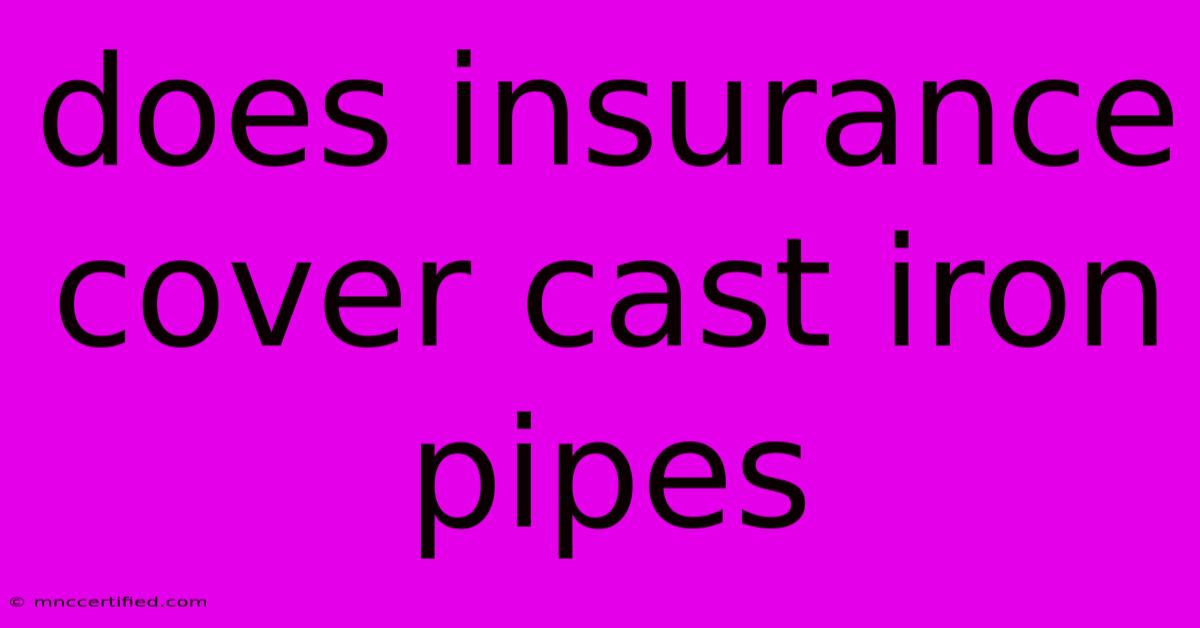Does Insurance Cover Cast Iron Pipes

Table of Contents
Does Insurance Cover Cast Iron Pipes? A Comprehensive Guide
Cast iron pipes, once a staple of plumbing systems, are notorious for their susceptibility to corrosion and leaks. As homeowners, we naturally worry about the potential costs of replacing these aging pipes. But does your insurance cover the expense of replacing cast iron pipes? The answer, unfortunately, isn't straightforward.
What Does Insurance Typically Cover?
Home insurance policies generally cover sudden and accidental damage to your plumbing system. This can include events like:
- Burst pipes: A sudden rupture caused by freezing temperatures or other unforeseen circumstances.
- Leaking pipes: A sudden leak that results in significant water damage.
- Pipe failures due to external forces: Damage caused by a fallen tree, earthquake, or other external factors.
However, insurance policies usually don't cover damage resulting from normal wear and tear. This means that corrosion, rust, and gradual deterioration of cast iron pipes are typically excluded from coverage.
When Your Insurance Might Cover Cast Iron Pipe Replacement
There are a few scenarios where your insurance might cover the replacement of cast iron pipes:
- If the pipe failure is due to a covered event: If a burst pipe or leak is caused by a sudden event like a fire, hailstorm, or impact from a falling object, your insurance might cover the replacement costs.
- If the pipes are part of a larger covered claim: If your home suffers significant damage from a covered event like a fire or flood, the replacement of the cast iron pipes might be included as part of the overall claim.
What To Do When Facing Cast Iron Pipe Issues
Even if your insurance doesn't directly cover cast iron pipe replacement, there are ways to protect yourself financially:
- Get a professional inspection: Hire a licensed plumber to assess the condition of your pipes and determine the extent of any potential damage.
- Check your policy details: Carefully review your insurance policy to understand your coverage limits and exclusions.
- Consider a separate plumbing coverage: Some insurers offer additional coverage for plumbing issues, including the replacement of aging pipes.
- Explore preventative measures: Regular maintenance and timely repairs can help prevent catastrophic failures and reduce the risk of costly replacements.
Don't Be Left In The Cold: Protect Your Pipes
While insurance may not cover the gradual deterioration of cast iron pipes, taking proactive steps can save you significant financial headaches in the long run.
- Invest in regular inspections: Schedule annual plumbing inspections to detect potential issues early on.
- Maintain your pipes: Follow preventative maintenance tips like regular flushing, cleaning, and leak detection.
- Consider upgrading: If your pipes are showing signs of wear and tear, explore the possibility of upgrading to more durable materials like copper or PEX.
Remember, proactive measures can significantly reduce the risk of costly repairs and ensure peace of mind for your home's plumbing system.

Thank you for visiting our website wich cover about Does Insurance Cover Cast Iron Pipes. We hope the information provided has been useful to you. Feel free to contact us if you have any questions or need further assistance. See you next time and dont miss to bookmark.
Featured Posts
-
La Liga Sociedad Edges Barcelona 1 0
Nov 11, 2024
-
Armistice Day 2024 Uk Ambassador In Diego Suarez
Nov 11, 2024
-
Steel City Derby Sheffield United Claims Victory
Nov 11, 2024
-
Roadside Assistance Pronto Insurance
Nov 11, 2024
-
Messis Next Chapter Inter Miamis Future
Nov 11, 2024